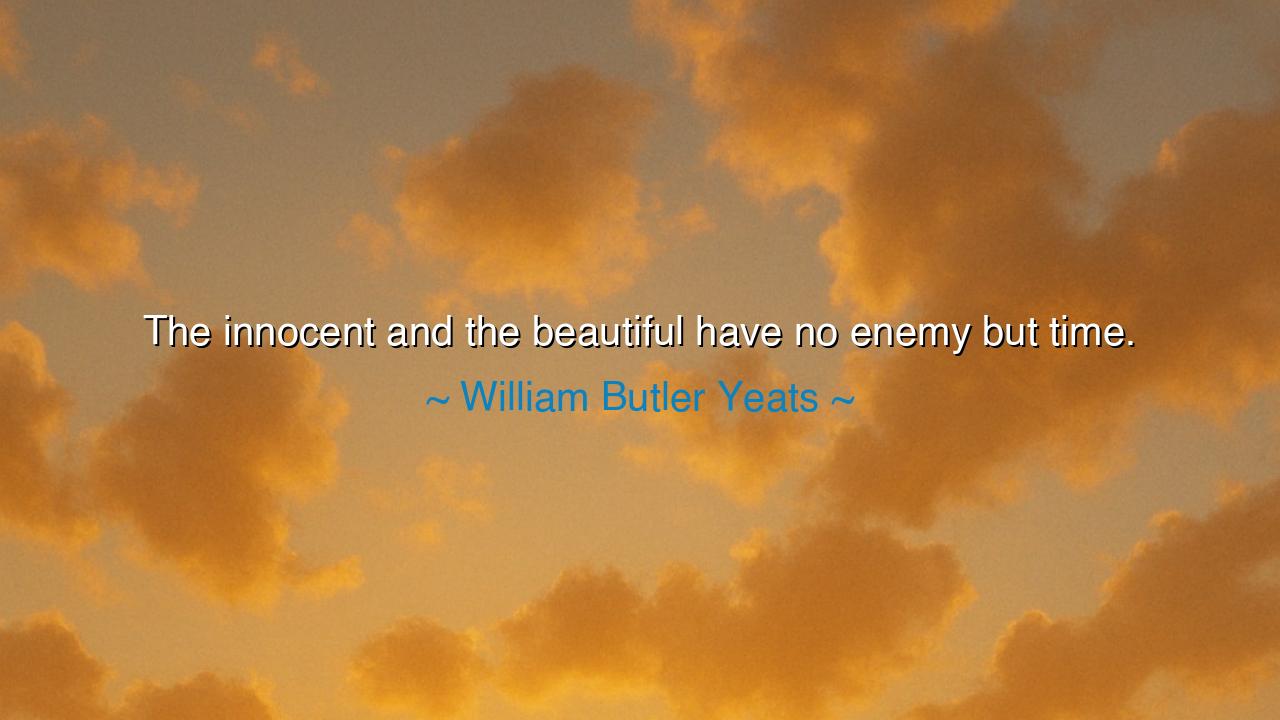
The innocent and the beautiful have no enemy but time.






The words of William Butler Yeats—“The innocent and the beautiful have no enemy but time.”—resound with the sorrow of a poet who gazed upon life with both love and lament. In this single line, Yeats captured the tragedy of purity and beauty: that they are not destroyed by malice, nor undone by violence, but slowly, silently eroded by the passage of hours. For the cruel may be struck down by justice, and the wicked undone by their own hands, but the innocent and the beautiful—those untouched by corruption—are undone only by time, the most patient and inevitable of enemies.
The ancients too understood this truth. The Greeks told of youth and beauty as gifts from the gods, fleeting as the morning dew. In their myths, Aphrodite herself could inspire awe, but even she wept for Adonis, whose beauty was brief. The Romans carved into marble the idealized forms of the young, hoping to defy decay, to preserve in stone what flesh could not. Yeats, standing in their tradition, reminds us that innocence and beauty are not destroyed by sin or fault, but by the natural course of existence—by the slow march of age.
History offers us radiant examples of this truth. Think of Anne Frank, whose innocence was never corrupted by hate, even as darkness surrounded her. She did not perish by wickedness in her heart, but by the passage of history, the cruel unfolding of a time that swallowed her youth. Her beauty was of spirit, not only of form, and yet even such beauty could not withstand time’s devouring hand. So too countless children of every age, whose purity is lost not to enemies of flesh, but to the relentless enemy of years.
Even in art, we see this lament. The Pre-Raphaelite painters of the nineteenth century sought to capture the luminous innocence of maidens and muses, knowing their freshness would not endure. Portraits of youth, poems of early love, sonnets to beauty—all are human attempts to resist the slow theft of time. Yeats himself, in love with Maud Gonne, wrote often of beauty fading, lamenting that time would rob even the most radiant soul of its youthful glow. Thus, the quote is born not only of wisdom, but of longing.
Beloved listener, the meaning is not despair, but awakening. If innocence and beauty have no enemy but time, then they are treasures to be cherished while they shine. For their very fragility makes them precious, like flowers that bloom for a season and then wither. Their transience is not failure but the essence of their value. Yeats urges us not to curse the fleeting nature of such gifts, but to love them more deeply because they do not last.
The lesson for our lives is this: do not take for granted the innocence of children, the beauty of youth, the fleeting glow of the present moment. Protect them, savor them, and honor them, for time will one day carry them away. Yet also remember that while time steals the form, it cannot steal the memory, nor the soul’s radiance, nor the love we bear for what has passed. In this way, innocence and beauty endure beyond their fragile season.
Practical wisdom demands this: look with gratitude upon what is beautiful now, instead of longing endlessly for what was or what might be. Take photographs, write words, hold conversations that preserve the glow of the moment. More importantly, cultivate the kind of inner beauty and spiritual innocence that time cannot erode—kindness, wisdom, and truth. For though time conquers flesh, it cannot conquer the eternal virtues of the soul.
So let Yeats’s words echo like a bell across your heart: “The innocent and the beautiful have no enemy but time.” Let them remind you of life’s fragility, but also of its urgency. Do not wait to love, do not delay in cherishing, do not waste the fleeting wonder of now. For innocence and beauty are fragile flames, and though time will dim them, your reverence for them can make their light eternal.






AAdministratorAdministrator
Welcome, honored guests. Please leave a comment, we will respond soon